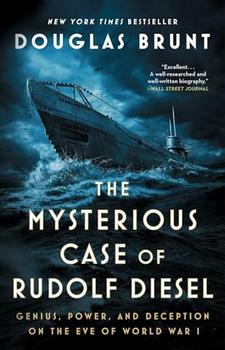Summary | Excerpt | Reviews | Beyond the Book | Readalikes | Genres & Themes | Author Bio

Genius, Power, and Deception on the Eve of World War I
by Douglas BruntPROLOGUE
OCTOBER 11, 1913.
There was something in the water.
Crew members of the Dutch pilot steamer Coertzen approached the object that had caught their attention. There, near the mouth of the Scheldt River along the eastern edge of the English Channel, in the rippling black, the men on the small vessel realized what they'd seen.
It was a body.
Though the decomposition was ghastly, the sailors noticed the fine quality of the clothing that still wrapped the body. Pulling the remains alongside the boat, they plucked four items from the pockets of the deceased before releasing the rotting corpse back into the waves: a coin purse, a penknife, an eyeglass case, and an enameled pillbox. The steamer then made its scheduled call to the Dutch port city of Vlissingen, where the crew reported the discovery and turned over the items.
Harbor officials immediately wondered if the report from the Coertzen could be connected to the missing person case that had been in the headlines of newspapers in every major city in Europe and America. Officials sent word to the missing man's son, who arrived in Vlissingen from Germany the next day. As soon as he saw the items, Eugen Diesel confirmed that they belonged to his father, Rudolf.
Rudolf Diesel, the inventor of the revolutionary engine that bears his name, had disappeared almost two weeks earlier during an overnight crossing of the English Channel on his way from Belgium to London. The captain of the passenger ferry had reported Herr Diesel missing at sea, in international waters where there was no legal jurisdiction and no investigatory authority. Since there was no body, there had been no coroner's report. There was no trial by admiralty nor even a company hearing. There had been no official investigation at all.
Rudolf Diesel grew up during an industrial boom. In America it became known as the Gilded Age, in France it was called the Belle Époque. Economies flourished and urban centers developed at unprecedented rates. Through his childhood, Diesel witnessed this expansion from the vantage of an impoverished immigrant. His nomadic family scratched out a living in cities across Europe, until a relative recognized the boy's gifted mind and offered him a hand up.
At the age of twelve, Diesel took the modest opportunity for an education and made the most of it. With natural ability and the determination of the most desperate, he excelled at his studies, and by his early twenties he inhabited the most revered circle of engineers in Germany. His scientific peers were Edison, Tesla, Bell, Marconi, Ford, Einstein, the Wright Brothers, names that would achieve cultural immortality. These geniuses delivered innumerable advances in science, spawned new industries and destroyed existing ones, have been the subject of books, films, and other tributes, and have been the shoulders upon which countless others have stood. Yet Rudolf Diesel is missing from this list.
Throughout history, the world has often adopted technological advances in ways the inventor never imagined, and certainly never intended. The advances wrought by Diesel and his contemporaries changed their world from a place of decentralized rural economies to a place of mass industry, from the age of steam power to the age of oil, from battles fought at close range between men bludgeoning each other to mechanized warfare. As empires, both political and corporate, applied revolutionary technologies to accelerate their advance, the unintended consequences of an inventor's brainchild could wreak havoc and terror.
In the time before Diesel's engine became ubiquitous, the great battleships such as the British Dreadnought and the great passenger ships like the Lusitania and Titanic were equipped with steam engines. The steam technology pioneered by James Watt was as old as America and was the genesis of the Industrial Revolution. Shipbuilders installed a giant boiler filled with water, a coal-burning furnace stoked by teams of men to turn the water to steam, the steam pressure turned the gears of the engine, and finally a chimney and funnel that released black towers of smog from the coal furnace. It was rudimentary technology. A ship "raising steam" from the cool water in the boiler of an idle engine took hours to get under way, and the tons of coal needed to feed the furnace took up valuable cargo space. The dozens of men living on the ship to shovel the coal took up more space and needed to be fed as well. The massive and inefficient engines required the ships to hop from port to port around the globe to acquire more coal, announcing their advance with a smoke-stained sky visible for a hundred miles.
Excerpted from The Mysterious Case of Rudolf Diesel by Douglas Brunt. Copyright © 2023 by Douglas Brunt. Excerpted by permission of Atria Books. All rights reserved. No part of this excerpt may be reproduced or reprinted without permission in writing from the publisher.
Your guide toexceptional books
BookBrowse seeks out and recommends the best in contemporary fiction and nonfiction—books that not only engage and entertain but also deepen our understanding of ourselves and the world around us.